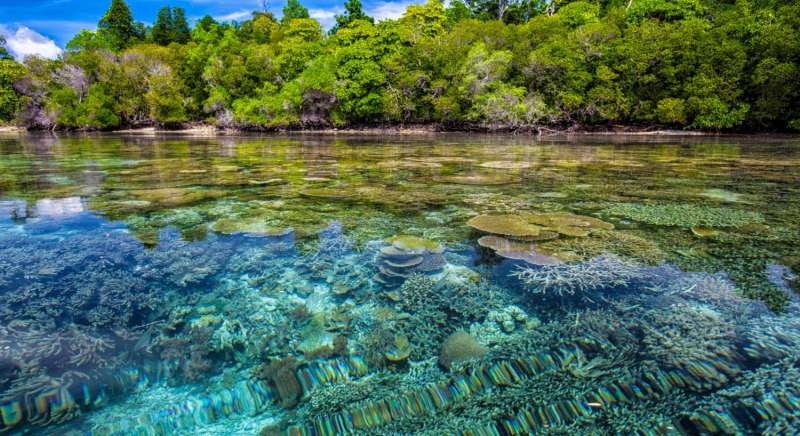'Visionary' project to save the Belize coast provides valuable framework

A coastal zone management plan designed to safeguard Belize's natural assets has produced a win-win opportunity for people and the environment, providing a valuable framework for other coastal nations around the world where overfishing, development, and habitat degradation are increasingly serious problems.
The new research, published in the International Journal of Biodiversity Science, Ecosystem Services & Management, is both community-driven and science-based and serves as a revolutionary example showcasing how integrated planning can be beneficial for both nature and people.
Belize's coral reefs, mangrove forests, and seagrass meadows support a high diversity of marine species, and are also critical to the economy, with more than 60% of the population depending on ecosystem services such as tourism, food, and coastal protection. Ecosystem services are the benefits people can obtain from nature. Unchecked development, overfishing, and offshore oil exploration have put these ecosystems and the benefits they provide at unprecedented risk and in 2009, the Belize Barrier Reef Reserve System was added to UNESCO's List of World Heritage in Danger.
This study documents how researchers from the Coastal Zone Management Authority & Institute and Natural Capital Project developed Belize's first integrated coastal management plan (officially approved by the Government in August 2016). Their approach was based on (1) spatial planning, (2) involving a wide range of stakeholders, and (3) modelling the flow of benefits from nature to people. By bringing together science, policy, and a diversity of voices, Belizeans endorsed a practical, evidence-based approach to protect ecosystems that provide long-term benefits to people and their economy.
The research team spent 5 years assessing risk to three different habitats (corals, mangroves, and seagrasses) posed by eight human activities (e.g., dredging, fishing, pollution). They also quantified and mapped the range of future benefits to people from three ecosystem services—protection from storms (5.5 to 8.3B BZ$), lobster harvest (3 to 21M BZ$), and tourism revenues (320 to 710M BZ$)—to protect values expressed by local communities and highlight the trade-offs between alternative coastal plans.
Ultimately, the preferred zoning plan balanced development and conservation objectives by strategically locating human activities to reduce areas of ecosystems at high risk, while allowing for the sustainable expansion of several ocean sectors of economic and traditional importance. This plan was described as 'visionary' by UNESCO in 2016.
The article's lead author Gregg Verutes said, "Our work in Belize shows how to use science about the ways in which nature benefits people to effectively and transparently inform coastal and ocean planning decisions around the world."
"It's a powerful example from the Government of Belize where ecosystem services and stakeholder involvement were used to overcome common barriers to sustainable development planning. Our community-driven process garnered local knowledge; Belizeans seized the opportunity to express diverse opinions, build important relationships and a shared vision for the future management and monitoring of their valued coastal zone."
More information: Gregory M. Verutes et al, Integrated planning that safeguards ecosystems and balances multiple objectives in coastal Belize, International Journal of Biodiversity Science, Ecosystem Services & Management (2017). DOI: 10.1080/21513732.2017.1345979
Provided by Taylor & Francis



















